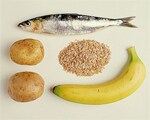Older adults with relatively low intakes of vitamins B6 and B12 have a higher risk of developing depression than those who get more of the nutrients.

B-vitamin deficiencies have been associated with depression; however, there is very little prospective evidence from population-based studies of in older adults. Vitamin B6 is found in a range of foods, including beans, potatoes, bananas, meat, chicken, peanut butter and certain fish, like salmon and tuna. The recommended intake for men older than 50 years is 1.7 mg per day, while women are advised to get 1.5 mg; the upper limit is set at 100 mg daily, as too much B6 can cause nerve damage. Foods naturally rich in B12 include beef, certain fish, like salmon and trout, and milk products; B12 is also added to some foods, such as fortified breakfast cereals.
To study the association between vitamin B inatkeintake and depression, reserachersresearchers followed 3,503 Chicago-areaAmerican adults who were at least 65 years old and depression-free at the outset. Participants' consumption of folate and vitamins B6 and B12 was estimated based on their responses to a detailed dietary questionnaire. They were then assessed for depression periodically over the next 12 years. People in the currentthis study consumed anywhere from 0.6 mg to 200 mg of B6 each day, while B12 intakes ranged from 0.3 to 266 mcg per day.
It was found that anywhere from 11 percent to 14 percent of participants had symptoms indicative of clinical depression at some point during the follow-up. When the reserachers at the relationship between B vitamins and depression, iIt was found that the risk of depression generally dippedreduced as consumption of B6 or B12 increased. The link held when the reserachers accounted, even after accounting for a number of other factors - such as race, education and income, antidepressant use and lifestyle habits like smoking and drinking.
While the results do not prove cause-and-effect, they do emphasise the importance of older adults' being mindful of their diets. The reserachersresearchers recommenderecommend that older adults should eat well-balanced diets and be conciousconscious about their nutritional intake and nutrient status. Both B6 and B12 are involved in healthy functioning of the nervous system function, and overt B12 deficiency causes a neurological syndrome that includes problems with thinking and memory, as well as depression symptoms.
DoctorNDTV is the one stop site for all your health needs providing the most credible health information, health news and tips with expert advice on healthy living, diet plans, informative videos etc. You can get the most relevant and accurate info you need about health problems like diabetes, cancer, pregnancy, HIV and AIDS, weight loss and many other lifestyle diseases. We have a panel of over 350 experts who help us develop content by giving their valuable inputs and bringing to us the latest in the world of healthcare.












